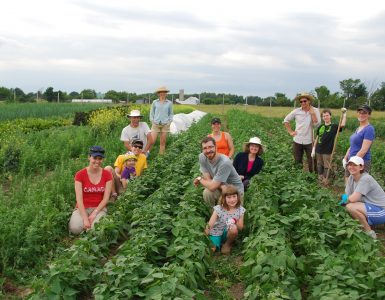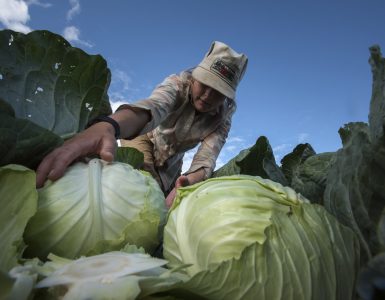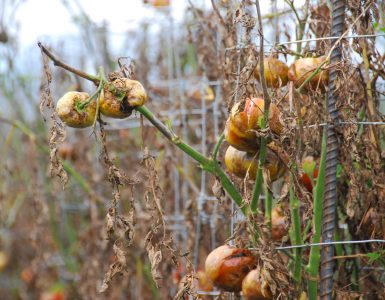This is the time of year when the last few flocks of migrating geese gorge themselves on fallen field corn before flying south. The other seasonal birds are mostly gone, but for a brief time migratory routes that span whole continents intersect with our with Kingston-area farms.
It’s not known where the phrase “the birds and the bees” was first used, but its metaphorical relationship to fertility is clear. If I go out and sit in our hedgerow in the middle of the summer, I can judge something about the health and fertility of our land by watching which birds and insects are around. And if I watch especially for migratory creatures—song-birds like the robin, insects like the Monarch butterfly—I can judge something about the health of our continent.
This summer, as the conventional grain fields were being sprayed with pesticide, two important new studies came out. The first, research from the International Union for the Conservation of Nature (IUCN) found that global invertebrate populations had dropped by 45 per cent in 35 years.
Invertebrates are a huge category. It’s not just insects like bees and butterflies, whose pollination activity we rely on for most of our food crops. The category includes 80 per cent of all species, everything without a spine, from the snails and shellfish who clean our water, to the earthworms who break down fallen leaves and build our soil. Invertebrates feed populations of songbirds and small mammals, without which larger predators—from wolves to hawks to humans—could not survive.
In my lifetime, the global population of invertebrates has dropped by nearly half. That’s absolutely astounding, and frankly it’s terrifying. Invertebrates are the animal foundation of our planet’s ecology.
Imagine living on the top floor of an apartment tower, and then going downstairs one day to find out that without you noticing, nearly half of the building’s structure had been torn away. That’s what this is like.
And there on the horizon, looming like a hurricane, is global warming. Leaving us to wonder: can this building survive that hurricane if its structure continues to be ripped apart?
A second study points to one cause of this population crash. Research at Radboud University in the Netherlands found a strong connection between the heavy use of pesticides and falling populations of insect-eating birds like swallows, starlings and sparrows. While it’s possible that some birds were being poisoned directly by the pesticides, researchers suggest an ecological cause: the pesticides were killing so many insects, in and out of farm fields, that the birds were starving.
In other words, pesticides are doing what they’re intended to do—killing insects—and they’re doing it without any limits. Pesticides don’t stop at the edge of a field; their effects spread through whole ecosystems.
Our farm is an organic farm. That’s a deliberate choice. I don’t pretend to be impartial on the issue of pesticides. A lot of people get food from us for health reasons, because they don’t want the food they eat to be sprayed with pesticides or herbicides.
But it’s clear the effects of our food system are wide-ranging, and go far beyond any particular person’s plate.
The phrase “everything is connected” is basically true, but it’s thrown around in such a generic, abstract way that people rarely think about the specifics. What we grow, how we grow it, what we spray on it, all these things have global impact on particular creatures.
This stuff about crashing bird or invertebrates populations can feel overwhelming. But I’m not telling you this because I want to overwhelm you; I’m telling you this because it’s happening, it’s important, and we need to do something about it.
Our choices and our local food system matter, and they matter on a really big scale. Kingston has been a hot spot for local food and ecological agriculture; people here care about this stuff. If that movement continues to grow, if people everywhere are to change in how our food system works, then maybe in another 35 years we’ll be able to open the paper and read about birds and invertebrates starting to recover.
Aric McBay is a farmer and author. He lives and works at a mixed family farm with a dairy herd and a vegetable operation.







